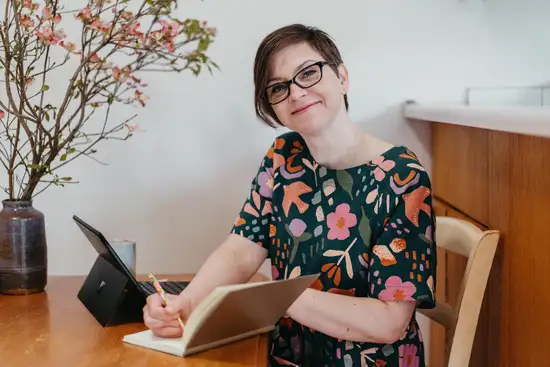Stephanie Cantrill
April 2023
Occupational therapist to copywriter
6 things a health professional career taught me about copy and content writing
 Image attribution: The wonderful Bec at
becmatheson.com
Image attribution: The wonderful Bec at
becmatheson.com
My career started out in healthcare. Specifically, I was an occupational therapist – first in a small town in regional Victoria, then in larger rehabilitation hospitals.
And then I did a Master of Public Health. And then I worked in community development. And then, and then… I started a career in copywriting.
A winding path is still a path, right? And all the steps along the way have been learning.
Tying some of that learning together, here’s what the health professional life has taught me about copywriting:
- Every client is different
- It's nice to be nice
- Rapport is a skill
- My experience counts
- Their experience counts
- There's a balance (there's always a balance)
1. Every client is different
I mean, of course. But it’s easy to categorise people without thinking.
Over 80, living alone, and broke your hip? Sorry, looks like you can’t go home. Probably ever.
Under 30, with several broken bones after a high-speed crash? You’ll be fine. Just drive more carefully next time.
What if the otherwise fit and healthy 80-year-old cracked her hip running full-pelt for a sneaky cross-court forehand in the Wednesday night tennis finals? Or maybe the young guy with multiple complex fractures needs to climb 15 rickety steps to get into his flat? You can’t make assumptions based only on the loose category a patient fits into.
Probably shouldn’t pigeonhole a copywriting client either.
They might be looking for web copy, for example, so you’d guess they want a suite of predictable pages (home, about, services). 500 words or so per page, with keywords in the right places. Friendly but professional style. Irresistible call to action.
But maybe they’re looking for something unique. Something out of the box. An interactive quiz that lets clients learn about their product in a fun and engaging way. Like you guess a song from the opening lyrics, and somehow that tells you why bamboo toothbrushes are better for the environment. (Side note: if pop music trivia copywriting is what you’re looking for, my hand is up and waving like that kid you remember from Grade 4 who always knew the answers but the teacher wanted to give someone else a go.)
They might want a site with mainly videos and minimal words, or something that’s more informative than folksy. Or a whole webpage in iambic pentameter.
But how to get this information? You just won’t know unless you seek it out. (If you’re familiar with iambic pentameter and wouldn’t mind humouring me, please read that last sentence again and know I tried.)
The fact is, I’m not going to know what a person wants or needs until I go to the effort of finding out.
 Ah, Mr Shakespeare. Look at you, just thinking about all that iambic pentameter and what it’s going to do to literature students’ brains centuries into the future.
Ah, Mr Shakespeare. Look at you, just thinking about all that iambic pentameter and what it’s going to do to literature students’ brains centuries into the future.Image attribution: Mike B pexels.com
2. It's nice to be nice
And, on that, sometimes it’s easy to forget the general niceties: social chit-chat, discussions about the weather, thoughtful enquiries about how their kids went on their exams.
That stuff can be the first step in building trust. And, without trust, it’s hard to really get to know your client and their needs.
3. Rapport is a skill
Trust starts with the friendly chats, but it’s more than that.
We might not all love small talk, but most of us can turn it on when we have to. The ‘so, what do you do?’ at parties, and the somewhat mindless conversation about busy shopping centres and whether a potato counts as a vegetable, is a thing we just sort of picked up along the way (see the reference to being nice above).
Building rapport, though, is a learned professional skill. I don’t remember it being taught, but having had plenty of students over the years I realise it’s not innate. There’s a finesse to it – combining the superficial chats you’d have waiting in the toilet queue at a sports match with something a bit more personal, but not too intrusive – and it’s a skill I want to hold onto.
Because rapport shows someone that you understand a bit about them but you want to know more, and lets them know that their information is in good hands. Sounds like a good skill for a copywriter.
 Image attribution: Matthias Zomer
pexels.com
Image attribution: Matthias Zomer
pexels.com
4. My experience counts
Impostor Syndrome, am I right?
As a professional, even after years of experience, I often doubted myself. What did I know that patients didn’t? Rapport shmrapport, why on earth would they trust me?
It’s not like I was the best occupational therapist to walk the windy hospital corridors. But I knew what I was doing.
And I know how to put sentences together. I’ve written many, many things in my life: stories, reports, fact sheets, essays, web pages, magazine articles.
I even know that you’re not supposed to start a sentence with a conjunction, and that a list in a sentence isn’t complete without one. I’m aware that the previous paragraph broke both these rules, and I’m confident enough not to care.
Sometimes confident. Other times, the impostor comes back to bite me.
But I’ve got this. Because my experience counts.
5. Their experience counts
Ok, so I’m not an impostor. But I also don’t want to impose.
I’ve got life experience and career experience and (not much) knitting experience. And clients have their own history.
In a clinical setting, I could’ve hit patients with my ‘expertise’ and told them what they needed. But listening is part of the deal in a therapeutic relationship. Patients often have more to contribute to treatment decisions than we give them time for.
A patient is, after all, a person, with their own blend of skills and knowledge and life experience. And me coming in and telling them what to think and what to do, without listening to the person who knows their needs better than anyone else does (ie, them), is disrespectful. And kind of pointless, because it probably wouldn’t get us anywhere.
So I could tell a client how their audience works and what they need to put on their website because I’m a copywriter and I know what I’m doing.
Or I could listen to them, as the experts in their own business, and create the content they want (and just quietly hope that they ask me to incorporate Whitney Houston and Duran Duran trivia into the copy).
 Doesn’t this photo just make you want to dance around the room in your leg warmers?
Doesn’t this photo just make you want to dance around the room in your leg warmers?Image attribution: Rikka Ameboshi pexels.com
6. There's a balance (there's always a balance)
Complement over conflict, I always say. (Fine, I’ve never said it before, but who doesn’t love a bit of pithy alliterative wisdom?)
A health professional’s priorities don’t always perfectly align with the patient’s. My experience and clinical knowledge might bump up against their expertise, preferences and priorities.
Win-win isn’t always achievable, but I wouldn’t say lose-lose is inevitable. Usually there’s a sweet spot of some kind, where perspectives and ideas find their balance.
It doesn’t have to be a battle. That’s where the listening and rapport and trust and all those other good things come into it, with both health and copywriting. And probably most things, if we’re honest.
My ideas, the client’s ideas, the internet’s thoughts on the matter – they can all come into play. And we’ll make something great because we’re capable humans with valuable experience.
I’m just gonna say complement over conflict again, because I like it. And I'm gonna keep using my health, development, writing and even knitting skills. Because, I think, everything we learn on this wobbly path is a good thing.
Do you want a self-confessed grammar nerd to write some copy for you? If so, feel free to get in touch.
Yes please - let’s talk copy and content!